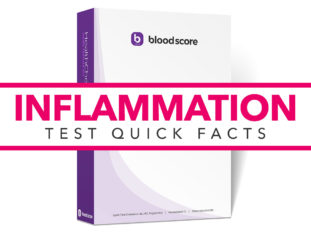Inflammation Basics: What you need to know about your inflammatory risk
Why is inflammatory risk important?
For good reason, there has been a lot of talk about inflammation lately—and even more talk about anti-inflammatory diets, lifestyle changes, and inflammation-fighting supplements. Chronic inflammation in your bloodstream is associated with, if not indicative of, a higher risk of developing heart disease.
We are not talking about inflammation associated with bumps and bruises, but instead we are focusing on chronic inflammation in the body due to chronic disease or exposure to foods or substances that cause an inflammatory response in your body. These may be unique to the individual.
Inflammation is the silent killer
There are almost no symptoms of chronic inflammation, and so many call chronic inflammation “the silent killer.” In fact, inflammation in otherwise healthy individuals (even with normal cholesterol levels) can predict an increased risk of a future heart attack, stroke, sudden cardiac death, or peripheral arterial disease.
Inflammation in otherwise healthy individuals can predict an increased risk of a future heart attack.
Research shows that chronic inflammation is a catalyst for many heart and metabolic diseases, including Diabetes, heart disease, high cholesterol, Alzheimer’s disease, autoimmune disorders, cancers, and more.
In addition, chronic inflammation can lead to poor gut health, poor nutrient absorption, insulin resistance, depression, and digestive disorders.For your wellness and longevity, reducing inflammation is vital.
What causes chronic inflammation?
Several conditions can cause internal inflammation; however, we are most focused on the lifestyle factors that lead to chronic inflammation and can cause disease in otherwise healthy people. Lifestyle factors that elevate inflammatory markers include:
Inflammatory foods (e.g., processed foods, refined oils, sugar, hydrogenated fats, gluten and dairy for some people, and many more)
- Sedentary lifestyle
- Environmental toxins
- Lack of sleep
- Stress
In addition to lifestyle factors, acute or chronic disease can also cause internal inflammation (e.g., heart attacks and heart disease, autoimmune conditions, some cancer). It is important to evaluate inflammation scores along with other blood tests and history in order to better understand the cause of inflammation.
You can measure internal inflammation
For otherwise healthy individuals, the best test to measure and monitor internal inflammation is the high-sensitivity C-reactive protein (hs-CRP) blood test.
Research shows that an elevated hs-CRP may be the only indication of an impending heart attack or stroke in healthy individuals (even those with normal cholesterol scores). That’s why Bloodscore includes hs-CRP in the Health Check test.
There are a few tests available to monitor inflammation inside the body. Bloodscore utilizes the hs-CRP test, which measures the level of the CRP protein in your blood. The CRP protein increases in the blood with inflammatory issues such as atherosclerosis (narrowing of the blood vessels due to cholesterol build-up).
This test is called high-sensitivity because it can recognize the low levels of inflammation in your bloodstream and predict your risk of developing heart disease.
With simple daily changes, you can reduce the chronic inflammation in your body and reduce your associated inflammatory risk of developing heart disease and other health disorders.
You can reduce the chronic inflammation in your body and reduce your associated inflammatory risk of developing heart disease and other health disorders.
So, what’s the goal?
The hs-CRP test indicates the level of inflammation in your bloodstream. The American Heart Association and U.S. Centers for Disease Control and Prevention have defined risk groups as follows:
- Low risk: less than 1.0 mg/L
- Average risk: 1.0 to 3.0 mg/L
- High risk: above 3.0 mg/L
This test is part of a total assessment for heart disease risk, which should also include personal and family history, as well as additional blood tests (e.g., total cholesterol, LDL, triglycerides, and blood sugar). These blood tests are part of the Bloodscore Health Check profile.
A few conditions can make hs-CRP results less reliable. Chronic arthritis conditions, recent illnesses, injuries, infections, or general inflammation will cause an elevated hs-CRP score, which is not necessarily indicative of an elevated risk of developing heart disease. Women on hormone replacement therapy (HRT) also have elevated hs-CRP. Certain drugs (e.g., NSAIDs like aspirin or ibuprofen, statins for lower cholesterol) can reduce the hs-CRP score.
Can I reduce my inflammatory risk?
Yes! The first step is to measure your inflammation level to determine your baseline and focus your efforts on reducing your inflammatory risk.
People with high risk scores should meet with their healthcare provider and investigate potential causes and corrective actions. Others should work to maintain the lowest hs-CRP score possible.
Healthy lifestyle changes and possibly natural remedies or over-the-counter supplements can help you reduce your chronic inflammation and risk.
Is “Normal” Really the Same for Everyone?
Knowing that your lab scores are within “normal” range is not enough. You should test frequently enough to establish lab score trends. You should follow your trends, so that if one of your levels starts to head in the wrong direction, you can make a change before it becomes a problem. Most health care providers only have time to identify whether your lab scores fall within “normal” range.
It is important to follow your lab trends so that you can make a change as soon as you see a score heading in the wrong direction.
Sources:
https://labtestsonline.org/understanding/analytes/hscrp/tab/test/
https://www.ncbi.nlm.nih.gov/pmc/articles/PMC3548567/
https://www.sciencedaily.com/releases/2012/04/120402162546.htm


